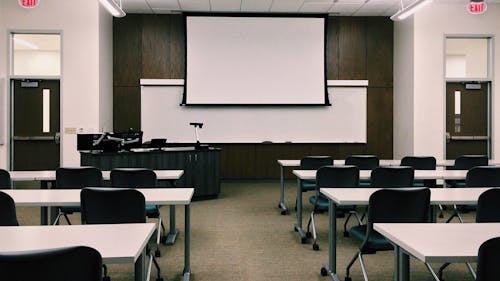Amid pandemic, hybrid courses become standard for many at Rutgers

With the University’s transition back on campus came a variety of courses using hybrid instruction as a safety measure against coronavirus disease (COVID-19). Several students and a professor shared their thoughts regarding experiencing hybrid classes for the first time.
Amy Jordan, a professor and chair of the Department of Journalism and Media Studies, said she is teaching in a hybrid format for the first time this semester, though temporarily.
Jordan changed the format of her Introduction to Media course from fully in-person to hybrid until Oct. 25 as a safety measure, she said. The course changed from meeting at full capacity in a large lecture hall twice per week to meeting at half capacity once a week.
“I felt both disappointed that I had to make the choice to go hybrid but also relieved,” Jordan said. “I feel that de-densifying our classroom so that only half of the students are in the classroom at any given time presents a much safer environment.”
Jordan said she worries about students not being able to understand what she teaches as a result of not being able to come into class normally, so she takes extra measures to convey the course material in an effective manner, which she said gives her more work to do as a professor.
Her weekly process involves both recording an asynchronous lecture and teaching the class in two separate groups for a synchronous in-person lecture. She holds her in-person lectures on Zoom at the same time for students who are sick or not comfortable coming into class because they are nervous about the delta variant, she said.
“I just don't know pedagogically how well the information is getting across as we’re pivoting every week,” Jordan said. “It feels a little bit like March of 2020 when we suddenly had to make choices and try to help the students figure out what they needed to know and what they were responsible for. I would say that this has been the hardest semester for me since the pandemic started.”
Several students experiencing hybrid classes for the first time expressed varying opinions on how hybrid learning has been for them, discussing the positive and negative aspects.
Noah Perry, a School of Arts and Sciences sophomore who is in Jordan’s Introduction to Media class, said he felt hybrid classes are a good change from the normal style of classes during this time because going to classes with full capacity can be stressful with having everyone together in one room.
“Having half the class go in one day and half the class the other day is kind of nice because you can spread out and really get comfortable,” Perry said.
He said that even though he was looking forward to in-person classes after a year of fully online classes, it made sense to him after seeing the lecture hall filled to its full capacity why it would switch to hybrid temporarily as a safety measure.
Victoria Szewc, a School of Arts and Sciences junior, discussed what it is like taking her required courses for her major through hybrid learning.
Szewc explained that her physics and chemistry classes, two important courses for the medical field, meet in-person once a week for recitation and online twice a week for lectures. She said this method is helpful for her because she is able to review the recorded lectures, which gives her easier access to the information she learns in class.
“It actually is more helpful to have the lectures online because I'm able to pause the recordings and take notes and understand it better,” Szewc said. “When I was fully in-person for my lectures, the professor would have to get in so much information within the hour and 20 minutes that they have that I would not be able to copy all the information that they were speaking about.”
Regarding the social aspect of classes, Perry said that even though students spread out when the hybrid classes meet in person, he still feels that he is able to meet other students and that everyone is able to talk to one another easily.
Maggie Hosler, a School of Arts and Sciences junior, agreed that the experience does not prevent students from being able to meet one another. She said meeting peers is a matter of putting oneself out there.
Szewc said her only issue with hybrid courses is the inability to attend review sessions and office hours in person because that is the only aspect of in-person instruction she felt she learned more from than hybrid instruction.
Jordan, Perry and Hosler all said that there is no specific detail or action they would change about the way that Rutgers executes its hybrid courses.
“They run it the best they can,” Hosler said. “They work with what they can, and they just want to make a safe environment. So no, I wouldn’t change anything."



